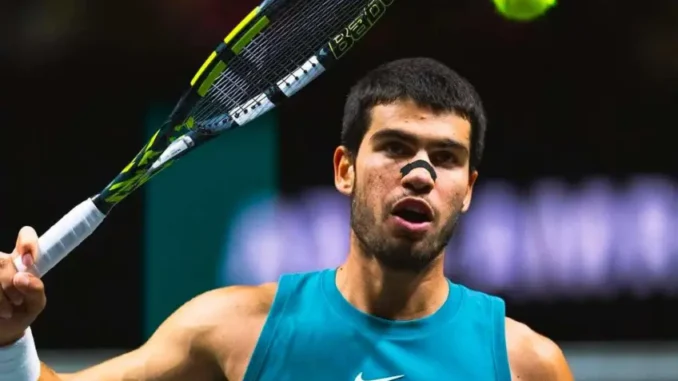
The tennis world has been abuzz with speculation following Carlos Alcaraz’s unexpected decision to forgo the traditional Golden Swing, the South American clay court circuit that typically follows the Australian Open. This decision, a departure from the usual path taken by many top players, has sparked considerable debate and conjecture within the tennis community. While Alcaraz’s official reasoning has been somewhat veiled, Steve Johnson, a veteran American player, has offered an intriguing theory that sheds light on the potential motivations behind this surprising move.
The Golden Swing, with its series of clay court tournaments in Latin America, has long been a fixture on the tennis calendar. For many players, it represents a valuable opportunity to accumulate ranking points and build momentum as the tour transitions from hard courts to the European clay court season. However, Alcaraz’s decision to skip this swing has raised eyebrows, prompting many to wonder about his strategic thinking.
Johnson’s theory centers around the idea of strategic periodization and peaking at the right time. He suggests that Alcaraz, under the guidance of his coach, Juan Carlos Ferrero, may be prioritizing a longer-term strategy aimed at maximizing his performance during the crucial clay court events in Europe, culminating in the French Open. This approach would involve carefully managing his schedule and workload to ensure that he is in peak physical and mental condition for the most important tournaments.
The European clay court season, with its prestigious tournaments in Monte Carlo, Barcelona, Madrid, and Rome, is a crucial stretch for any player hoping to contend for the French Open title. These tournaments provide valuable match practice and allow players to fine-tune their clay court game. Johnson’s theory posits that Alcaraz may be choosing to skip the Golden Swing to dedicate more time to training and preparation for these crucial European events.
This strategic approach is not uncommon in professional sports. Athletes often carefully plan their training and competition schedule to peak at the most opportune moments. By prioritizing the European clay court season, Alcaraz may be aiming to arrive at Roland Garros in optimal condition, both physically and mentally.
Another factor that may be influencing Alcaraz’s decision is the physical toll that the Golden Swing can take on players. The travel to South America, the quick turnaround between tournaments, and the demanding conditions on the clay courts can be taxing on the body. By skipping this swing, Alcaraz may be aiming to avoid potential burnout and minimize the risk of injury.
Johnson’s theory also touches upon the idea of mental freshness. The grind of the professional tennis tour can be mentally draining, and players need to find ways to stay motivated and focused. By taking a break from competition after the Australian Open, Alcaraz may be aiming to recharge his batteries and return to the court with renewed energy and focus.
The decision to skip the Golden Swing is a bold move for a player of Alcaraz’s caliber. It signals a willingness to deviate from the traditional path and to prioritize his long-term goals. It also demonstrates a level of maturity and self-awareness that is rare for a player of his age.
While Alcaraz’s official explanation for skipping the Golden Swing has been somewhat vague, Johnson’s theory provides a plausible explanation for this unexpected move. It suggests that Alcaraz and his team are taking a long-term view, prioritizing strategic periodization and peaking at the right time.
The European clay court season will be a crucial test for Alcaraz. His decision to skip the Golden Swing will be validated if he performs well in these tournaments and arrives at the French Open as a genuine contender. If he struggles, however, his decision will be questioned.
Ultimately, only Alcaraz and his team know the true reasons behind his decision. But Johnson’s theory offers a compelling perspective on the potential motivations behind this surprising move. It highlights the strategic thinking that goes into managing a professional tennis career and the importance of peaking at the right time.
The tennis world will be watching closely to see how Alcaraz performs in the upcoming clay court season. His decision to skip the Golden Swing is a gamble, but it’s a gamble that could pay off handsomely if he achieves his goals. It’s a testament to his ambition, his confidence, and his willingness to take risks. And it’s a reminder that in the world of professional tennis, sometimes it’s the unconventional path that leads to the greatest rewards.
Leave a Reply